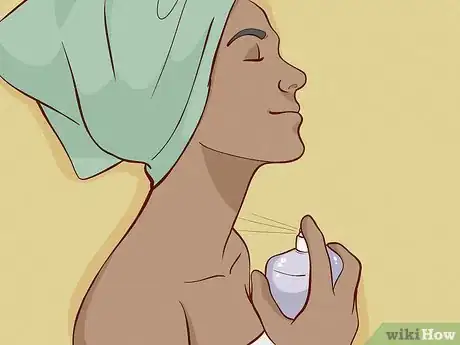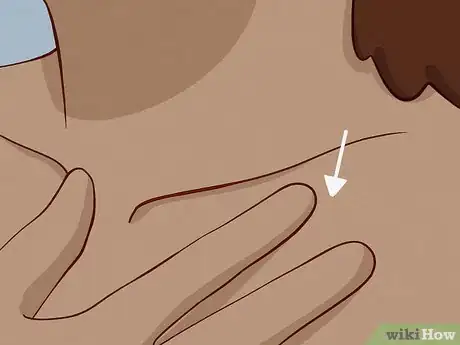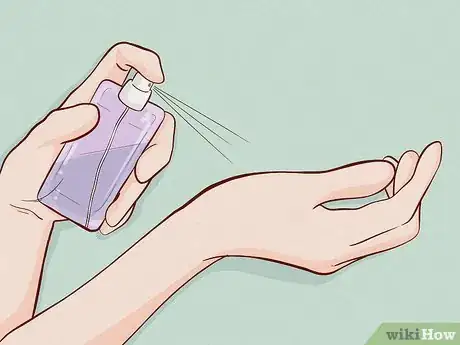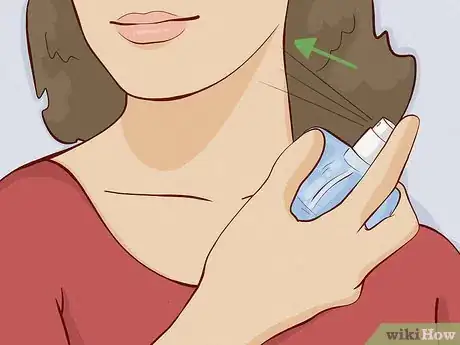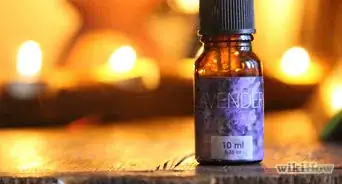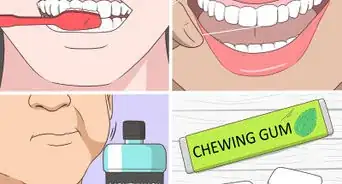This article was co-authored by wikiHow Staff. Our trained team of editors and researchers validate articles for accuracy and comprehensiveness. wikiHow's Content Management Team carefully monitors the work from our editorial staff to ensure that each article is backed by trusted research and meets our high quality standards.
There are 7 references cited in this article, which can be found at the bottom of the page.
Learn more...
You’ve finally convinced your friend to tell you the name of her signature fragrance, but once you purchase it, you realize it just doesn’t smell as good on you. How is that even possible? Well, it all comes down to something called body chemistry! The way a perfume reacts with your body can transform its scent over time, making it seem like an entirely different fragrance. In this article, we’ll teach you how body chemistry affects perfume so you can choose the perfect scent that suits you.
Things You Should Know
- When choosing a perfume, look at the different notes to see how the scent changes over time—the base notes give you the best impression of the scent in the long run.
- Fragrances absorb better on oily skin, so if you have dry skin, apply moisturizer before spraying your perfume.
- Before purchasing a new fragrance, apply it on your pressure points, and see if you still enjoy the scent after an hour.
Steps
The Breakdown of Scent
-
1Separate the different notes. Similar to how musical notes make up a song, perfume notes are different layers of scents that make up a fragrance. When you first spray perfume, the notes are released in the following order:[1]
- The top notes are what you smell immediately. They’re usually the lightest of all the notes, with scents like citrus, berries, and herbs.
- The middle notes appear when the top notes evaporate. Also known as the “heart” of the fragrance, they typically introduce a floral, fruity, or spicy scent to deepen the perfume.
- The base notes make up the perfume once the middle notes wear down. They’re considered the foundation of the fragrance, often associated with woody or musky scents.
-
2Familiarize yourself with the different scent families. In the fragrance world, there are 4 scent families: floral, fresh, oriental, and woody. Most of the time, people lean towards one family, so figuring out which scent you prefer can help you choose the right perfume:[2]
- The floral family is described as powdery or sweet, depending on the particular blooms. They often include notes of carnation, gardenia, jasmine, or rose.
- The fresh family consists of “green” notes—think freshly cut grass, light citruses, and spring air.
- The oriental family is made up of sweet, spicy, and exotic scents, usually with a base note of vanilla or amber.
- The woody family features aromatic wood and moss notes like oak, cedarwood, and sandalwood, but you can also find patchouli or pine mixed in them.
Advertisement -
3Differentiate between parfum, eau de parfum, and eau de toilette. Perfume comes in many different forms, depending on the concentration of pure perfume oil. In general, higher concentrations are more expensive, intense, and longer lasting, but many people prefer the freshness of a lighter, affordable fragrance.[3]
- Parfum has the highest concentration of fragrance oil, between 15-40% perfume extract.
- Eau de parfum has a lower concentration of fragrance oil than perfume, at about 10-20% perfume extract.
- Eau de toilette has the lowest concentration of fragrance oil, between 4-15% extract.
How Body Chemistry Affects Fragrance
-
1Fragrances develop better on people with oily skin. If there isn’t enough moisture for fragrance molecules to adhere to, your perfume evaporates quickly (decreasing the lasting power of the fragrance). Oils help fragrance absorb easily into the skin, so perfumes typically last longer on those with oily skin types.[4]
- If you have dry skin, apply moisturizer or Vaseline on your pulse points before spraying your perfume.
-
2Sweat disrupts the scent and longevity of a fragrance. If your fragrance smells different when you apply it on hot or humid days, you’re not alone! Since sweat contains bacteria and acids, it can destroy the original scent of your perfume and decrease its wear time.[5]
- If you sweat a lot, choose a fragrance with a higher perfume oil concentration, such as a parfum or eau de parfum.
- To preserve the original scent of your fragrance, spray it on your clothes and hair (instead of your skin).
-
3Some people believe pheromones affect how fragrances smell on them. Pheromones are secretions that give each person their unique scent. Since people smell different naturally, this can explain how one fragrance smells good on someone and smells terrible on another.[6]
Testing Your Perfume
-
1Apply the perfume directly on your pulse points. To reveal the true scent of a fragrance, spray it on your pulse points—behind your ear, on your wrist, and inside your elbow. This allows the fragrance notes to intensify, giving you a good impression of what it smells like on you.[7]
- Make sure you don’t rub your wrists together—rubbing the scent can break up the fragrance molecules and disrupt how the notes naturally develop.
-
2See how the scent changes throughout the day. Since the top and middle notes of a perfume evaporate over time, check if you still enjoy the scent after an hour. Sometimes, a floral fragrance can transform into something musky and intense, so you want to make sure the base notes are what you expect.[8]
-
3Wear your perfume in at least 2 different environments. Since your surroundings can affect how your perfume smells on you, test your fragrance on 2 different days—during the daytime and evening.[9]
- Instead of running to the mall multiple times to try a new fragrance, ask for samples at your local department store or Sephora.
References
- ↑ http://www.perfume.org/all-about-perfume/what-are-top-notes-heart-notes-and-base-notes-fragrance-notes-explained
- ↑ http://www.perfume.org/all-about-perfume/How-to-find-a-perfume-that-is-right-for-you
- ↑ https://slate.com/human-interest/2015/03/what-is-the-difference-between-perfume-eau-de-toilette-and-eau-de-cologne.html
- ↑ https://colognoisseur.com/perfume-mythbusters-skin-chemistry
- ↑ https://medium.com/@beureka/how-body-chemistry-affects-perfume-6248f5f7069a
- ↑ https://www.lunduniversity.lu.se/article/facts-and-fallacies-about-perfumes-and-body-odours
- ↑ https://www.nytimes.com/2019/02/21/smarter-living/how-to-choose-perfume-cologne-fragrance.html
- ↑ https://www.nytimes.com/2019/02/21/smarter-living/how-to-choose-perfume-cologne-fragrance.html
- ↑ https://www.nytimes.com/2019/02/21/smarter-living/how-to-choose-perfume-cologne-fragrance.html
